Could someone please help me out in writing Junit for this piece of code and provide resources to learn the same. I have been trying to figure out from multiple resources but couldn't find anything. I need to mock the pointcuts and methods which are invoked within the pointcut. Is unit testing possible for this using Mockito
import org.aspectj.lang.annotation.AfterThrowing;
import org.aspectj.lang.annotation.Around;
import org.aspectj.lang.annotation.Aspect;
import org.aspectj.lang.annotation.Before;
import org.aspectj.lang.annotation.Pointcut;
import org.slf4j.Logger;
import org.slf4j.LoggerFactory;
import org.springframework.stereotype.Component;
import com.sample.api.rest.account.AccountResource;
import com.fasterxml.jackson.core.JsonProcessingException;
import com.fasterxml.jackson.databind.ObjectMapper;
import lombok.CustomLog;
import lombok.extern.slf4j.slf4j;
@Aspect
@CustomLog
public class sample {
ObjectMapper mapper = new ObjectMapper();
long startTimeController = 0L;
long endTimeController = 0L;
@Pointcut("within(com.sample.api.rest.account. .) || "
+ "within(com.sample.api.rest.metadata..') ")
public void entryController() {}
@Pointcut("within(com. sample.api.rest.user..*)")
public void entryControllerUser() {}
@Pointcut("within(com.sample.api.service. .*)")
public void entryService() {}
@Pointcut("within(com. sample.cmo.repositories..*)")
public void entryDAO() {}
@Before("entryController()")
public void beforeOtherControllerCall(JoinPoint jp) throws JsonProcessingException {
String methodName = jp.getSignature().getName();
String className = jp.getTarget().getClass().toString();
Object[] arguments = jp.getArgs();
log.info(className + " Method : " + methodName + " Arguments passed : " +
mapper.writeValueAsString(arguments));
startTimeController = System.currentTimeMillis();
}
@Before("entryControllerUser()")
public void beforeUserControllerCall(JoinPoint jp) throws JsonProcessingException {
String methodName = jp.getSignature().getName();
String className = jp.getTarget().getClass().toString();
log.info(className + " Method : " + methodName);
startTimeController = System.currentTimeMillis();
}
@After("entryController() || entryControlleruser()")
public void afterControllerCall(JoinPoint jp) throws JsonProcessingException {
endTimeController = System.currentTimeMillis();
String methodName = jp.getSignature().getName();
String className = jp.getTarget().getClass().toString();
log.info(className + " Method : " + methodName + " Values returned :");
if (endTimeController != 0) {
log.info("Time consumed in " + className + " " + methodName + " call is "
+ (endTimeController - startTimeController) + "ms");
}
}
@Around("entryService()")
public Object executionTimeService(ProceedingJoinPoint pjp) throws Throwable {
String methodName = pjp.getSignature().getName();
String className = pjp.getTarget().getClass().toString();
Object[] arguments = pjp.getArgs();
log.info(className + " Method: " + methodName + " Arguments passed :" +
mapper.writeValueAsString(arguments));
long startTime = System.currentTimeMillis();
Object obj = pip.proceed();
long endTime = System.currentTimeMillis();
log.info(className + " Method : " + methodName + " Execution time: " + (endTime -
startTime) + "ms");
log.info(className + " Method : " + methodName + " Response received : " +
mapper.writeValueAsString(obj));
return obj;
}
@Around("entryDAO()")
public Object executionTimeDAO(ProceedingJoinPoint pjp ) throws Throwable {
String methodName pjp.getSignature().getName();
String className pjp.getTarget().getClass().toString();
Object[] arguments = pjp.getArgs();
log.info(className+" Method : "+methodName+" Arguments passed :"
+mapper.writeValueAsString(arguments) );
long startTime = System.currentTimeMillis();
Object obj = pip.proceed();
long endTime = System.currentTimeMillis();
log.info(className+" method : " + methodName+" Execution time: "
+(endTime-start Time)+"ms" );
log.info(className+" Method: "+methodName+" Response received : "+
mapper.writeValueAsString(obj));
return obj;
}
}
Here is the sample of what I have tried with
@Test
public void testBeforeOtherControllerCall() throws Throwable{
JoinPoint joinPoint = mock(JoinPoint.class);
AspectLogging logging = mock(AspectLogging.class);
String[] args = {"arg1", "arg2"};
Object[] obj args)
Signature signature = mock (Signature.class);
when(joinPoint.getSignature().thenReturn(signature);
when(signature.getName().thenReturn("MethodName");
Object object = mock(Object.class);
when(joinPoint.getTarget().thenReturn(object);
when(object.getClass().thenReturn(objectClass);
when(joinPoint.getArgs().thenReturn(obj);
logging.beforeOtherControllerCali(joinPoint);
verify(joinPoint, times (1)).getSignature().getName().equals("MethodName");
}
